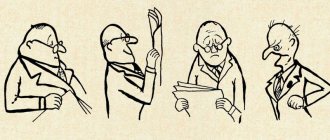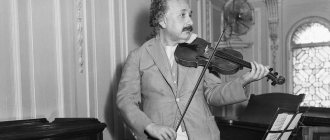Hi all! Lyudmila Redkina is with you. I won't tell you a secret if I tell you that I'm different from you! No, not by place of residence, not by education and years, although this is also important! I am different in my experiences, reactions, views on life and on you, in fact! If I knew everyone reading this article personally, do you think we could become friends? Is not a fact! And not because we have shortcomings, but because we are different in our personality types. This is why we understand or don’t understand someone, but don’t want to have anything in common with someone at all. This article will talk about what personality types there are and how they affect human behavior.
What is personality
A personality is a person who enters into relationships with the environment and manifests himself in the process of activity. It is also a set of properties, qualities, mental abilities, physical and emotional characteristics. They make a person individual and are revealed in the process of interaction with society.
Personality is manifested through habits and preferences, the use of accumulated knowledge. Different situations lead to changes in behavior; a person determines tactics based on experience, relying on emotions. Depending on this, there are different types of people. For example, they are divided by their ability to perceive information. Visual learners trust their eyes more, auditory learners trust hearing, and kinesthetic learners trust tactile sensations.
Competitive Behavior
This type of behavioral reaction of an individual is expressed in the fact that he perceives people as potential or actual competitors. This look provokes him to fight or compete with them. The main point of this behavior is to win or gain an advantage. It is directly related to the A type of human behavior in an organization.
These are impatient, irritable, distrustful, hostile people. Opposite to it is behavioral line B, according to which the individual does not strive for competition and treats everyone around him kindly.
Personality structure
Socionics - personality types of people
Personality structure is the properties of a person, his reactions to situations, characteristics of behavior, manners, actions that determine his position and influence his activities.
According to the theory of the Russian doctor and psychologist Lazursky, who has been engaged in scientific research for many years, the personality structure is determined by:
- Mental functions (perception, memory, speech, thinking, imagination);
- External mechanisms (attitude to the surrounding reality and the team).
The Soviet teacher and psychologist Kovalev considered personality as the interconnection of the following elements:
- Temperament, which is the properties determined by human nature. This is a mental and mental state that affects behavior and relationships with the environment;
- Sets of needs and ideals;
- Abilities, which include both intellectual capabilities and physical and emotional development.
Based on scientific approaches, to characterize a personality, it is necessary to evaluate its components:
- temperament;
- will;
- emotional development;
- physical and mental abilities;
- motivation;
- character traits;
- social attitudes.
Different people
The reason for dividing people into types
Intrapersonal conflict in psychology - types, causes and consequences
In psychology, it is customary to distinguish types of people, dividing them into groups, depending on behavioral reactions, emotional manifestations, tendency to excitability and intellectual abilities. There are many online tests that allow you to assess temperament or character, helping to determine how a person will behave in a non-standard critical situation.
Note! Survey data is used when hiring to understand whether the applicant is suitable for the chosen position. It is useful to notice a person who is called a “narcissist.” It’s hard to work with him, because he doesn’t see anyone around him and doesn’t respect other people’s opinions.
Some rely on test data to find their soulmate. Theories have been developed about the compatibility of people with similar or different character traits and social attitudes.
To select employees, it is important to evaluate the relationship between initiative and responsibility and to evaluate people’s activity. Based on this feature, Ksenia Aleksandrovna Slavskaya, a psychologist and philosopher, created a classification of personality types, where, for example, the harmonious type included people who proposed an action plan and were responsible for its implementation. Contemplative - they put forward an idea, but could not cope with it on their own. Personality typology is used by pedagogy in order to eliminate conflicts and normalize the atmosphere in the team.
Children's group
Additional Information. There is a direction in psychology that studies corrupt behavior, this is important when interrogating suspects. A brief description of such personality types is the use of psychological defense methods, speed in decision-making, and a sense of impunity.
Socionic personality types
Hyperthymic personality type - what is it in psychology
Socionics is a science designed to study personality types and the relationships between them. She pays a lot of attention to the perception and use of information that a person encounters every day.
There are the following types of personality:
- Dostoevsky. He is distinguished by highly developed intuition and the ability to empathize. At the same time, he will never put his interlocutor in an uncomfortable position. Innate politeness and sense of tact will not allow him to offend a person;
- Yesenin is able to calculate the outcome of an event in advance; he acts several steps ahead of the others;
- Don Quixote lives outside of boundaries and time. He finds several ways to solve problems and can evaluate the benefits of each action;
- Jack London. A person of this type is cold and acts based on logic. To achieve the goal, he notices everything that surrounds him, using information and people as resources;
- Stirlitz wonderfully organizes the work of the group, acting as its leader. Everyone will feel comfortable. Stirlitz himself is also capable of completing the tasks facing him;
- Hamlet lives by emotions, skillfully managing them to create the atmosphere he needs;
- Robespierre is conscientious, responsible and efficient. Power and glory are in last place for him;
- Balzac is able to notice details and will not forget to make a caustic remark, which is why he is often considered a cynic;
- Gaben loves comfort and regularity in everything. He will choose comfort and tranquility, protect himself from noise and bustle;
- Huxley is curious and attentive. He can read between the lines and see what others see as fantasy. He tends to dream, which helps him reach unprecedented heights;
- Gorky thinks rationally, putting cause-and-effect relationships at the forefront;
- Dreiser lives based on moral principles. If something goes against them, he falls into indignation and will never give up his opinion;
- Dumas is a true introvert who creates his own cozy world;
- Napoleon is a leader, a fighter, striving to show his superiority at every opportunity. He is stubborn and always gets his way;
- Zhukov is also confidently moving towards the goal. Guided by cunning, showing selfishness, regardless of people and their desires;
- Hugo is charismatic and positive. He charges everyone around with a positive attitude.
Napoleon as an image of a sociotype
Each of the personality types in psychology belongs to one of four groups:
- parents;
- infantile personalities;
- aggressors or victims;
- victims.
Note! According to psychologists, opposites form strong pairs; they attract and complement each other. For example, Jack London and Dreiser, as a victim and an aggressor, or Don Quixote and Dumas, an infantile personality and a parent.
Personality types in conflict situations
Conflicts are an integral part of life. It is often impossible to do without them, and avoidance will only aggravate the tension and push the goal away. What are the types of personality, depending on behavior in conflict:
- Demonstrative. He strives to be the center of attention, so he creates conflicts to make others remember him. It is better not to leave such people aside, but to give them compliments and praise. This will calm them down, the desire to conflict will decrease;
- Rigid. Conflicts arise due to a person’s touchiness. He constantly feels like he is underestimated or offended. He tends to take everything personally and does not tolerate defeat. It is important for him that his truth be recognized; he himself will never refuse it. It’s better not to provoke such a person; it’s easier to smooth out the unpleasant situation and apologize. A constructive dialogue with him is unlikely to happen;
- The uncontrollable type relies on emotions. It flares up easily and cools quickly when it releases steam. Then he becomes accommodating and is ready to make concessions. He shouts loudly, explaining his position, and can show aggression;
- The ultra-precise type constantly worries about his own safety. He is too suspicious and anxious. Demands performance at a high level from those around him. Treats himself with even greater pickiness. He's easy to hit. He experiences resentment in private, avoiding public conflicts;
- The conflict-free type is the most unpleasant type. He dislikes arguments so much that he avoids them in every possible way. Agrees and follows the lead, a person changes his point of view and tactics of behavior. He depends on the personality forcing him to accept a different opinion. This is an unreliable, unprincipled person for whom it is important to avoid quarrels;
- The conflict type will resolve any controversial situation, turning it in their favor. He even creates it on purpose, because he is confident in himself and has sufficient arguments to win, no matter how many opponents he has.
Conflict situation
Secrets of interaction with each psychotype
Let's look at the specifics of interaction with each of the psychotypes according to Leonhard's classification:
- Hyperthym. Help hypertim direct energy in a useful direction, give direct instructions, entice him into something like a child. Do not criticize him or set strict boundaries, respect the hypertim’s freedom and his interests. That is, in choosing a hobby you need to find what attracts him.
- Distim. Avoid criticism, harsh language, and arguments. Respect the rigidity of the dystimus, do not leave it alone with something new. Give compliments and support his self-confidence. Let's take some time to rest. Remember that distim gets tired quickly. Help him develop his abilities and overcome suspiciousness and uncertainty.
- Cycloid. It is interesting to live and communicate with such people. They are unpredictable and creative. However, this also becomes a cause of conflicts in business or personal relationships. Dealing with this type is like riding a roller coaster. What to do? Determine the cycle specifically for your friend. Learn to independently identify phases and adapt to them. For example, if you have long wanted to ask a cycloid for something, then wait until he is in a good mood. If you understand that now he has a loss of strength, then it is better not to overload him with anything and not to irritate him. It is important to accept the fact that the cycloid's brain cannot work any other way. Therefore, there is no point in being offended, making trouble, or trying to change a person.
- Excitable. Always strictly guard your personal boundaries and maintain social distance. Do not make concessions, prove your importance and authority. Do this with restraint so as not to provoke the person into rash actions.
- Stuck. Try to protect a person with a stuck psychotype from uncertainty. Be as consistent, open and clear as possible. Give instructions, say everything directly. However, don't let the stuck type violate your personal boundaries. Make it clear that you will not be pushed around. If you lack support, understanding and warmth from a stuck type, then find it elsewhere, for example, turn to friends.
- Pedant. One of the most difficult types. There are two options: either you accept his meticulousness, or leave this relationship. A pedant needs correctness, stability, and conscientiousness. The main thing is that the other participant in the relationship does not end up in a neurosis clinic in pursuit of this.
- Anxious. Encourage and praise him, show signs of attention, express your trust. Don't criticize unnecessarily. And if you have to do this, then first praise, and then wrap the criticism in the wrapper of a wish (“You’re doing everything well, if only… then you wouldn’t have any value at all”). Give more clear instructions, do not leave him alone in unfamiliar, frightening situations.
- Emotive. Never lie to an emotion. This is the only thing he does not accept. In all other cases, he himself will find an excuse, an explanation, a special approach for you. Don't play with emotive feelings, don't try to hide something. For example, if you are not interested in a person, then say so directly. He will not be offended or angry, but will step aside in a friendly and tactful manner. But a lie can offend him.
- Hysteroid. Help the hysteroid feel like the first, the best. This does not mean that you need to worship and obey him - be subtle. However, one should not admire too much and feed the illusion of superiority. That is, you can emphasize the real merits and achievements of the hysteroid. Get ready for your successes to anger and irritate him. Don't give in to provocations.
- Exalted. Avoid surprises, do not arrange surprises for the exalted type. Create the most stable soil in your relationship. Monitor your emotional reactions. Be discreet. Do not take his mood swings and affective outbursts personally. Do not enter into conflicts with an exalted type.
- Extrovert. Respect his need for social contact. Do not encroach on personal space or limit the freedom of an extrovert. For example, if your girlfriend is an extrovert, then you cannot ask her to communicate less with her friends and girlfriends, or to stay at home more often. In the end, you yourself will get tired of its activity. True, if you are both extroverts, you can find a source of strength in each other.
- Introvert. Respect personal space and the need for privacy. Do not get into the soul of an introvert; give him time for personal hobbies. Don't torment him with formal conversations.
Holland personality types
According to Holland, the following personality types are distinguished:
- Realistic. He is reality-oriented, has developed motor skills and spatial thinking;
- The intelligent species prefers to develop mental abilities. He is active, does not get distracted while working, and is immersed in the process;
- Social. He is sociable and tries to take a leadership position. Empathizes with the team, but will not miss the opportunity to teach a lesson;
- The conventional type is conservative and old-fashioned. Acts based on algorithms and standard schemes;
- The enterprising type is inventive and tends to burst into flames with ideas, even to the point of displaying aggression. Cannot sit still and concentrate on details;
- The artistic type trusts its intuition and loves to fantasize. Ignores rules, prefers creative activities.
Practical recommendations
Psychologists recommend that employers take advantage of the effect of involving different types of people in the process in psychology. High performance indicators and return characteristics can be achieved if the necessary conditions are created for the cooperation of people with different characters and temperaments.
An excellent team is made from choleric and phlegmatic people. The first ones react quickly in unexpected situations, but are characterized by a quick temper and are often ready to quit the work they have started. The latter are naturally given the gift of persuasion, so they have the ability to calm and convince, and bring their plans to their logical conclusion.
Melancholic people need the company of sanguine people, as the latter have an amazing ability to lift their spirits and infect them with optimism. Poor compatibility of characters and temperaments is observed between choleric people, since representatives of such types are characterized by imbalance, insufficient endurance and self-control.
Personality types in psychology
In psychology, there is a classification of people according to personality types:
- Explosive. A person reacts violently to events or words and is characterized by increased excitability. He is sullen, usually cruel and overly impulsive;
- The hysterical type wants to be recognized and noticed. For him, the main thing is the presentation of himself and his own emotions. He is extravagant, his behavior is theatrical. Such a person is fickle and cannot be called sincere. He overacts, trying to increase his importance;
- The asthenic type is fearful, too vulnerable people. They have little stamina and get tired quickly. A person is always preoccupied with something, tends to invent illnesses and create problems. The sad mood hides behind a mask of indifference, sometimes it seems too cheeky;
- The psychasthenic type is overly anxious and indecisive. He always doubts his actions and regrets what he has done. Such people double-check everything, are prone to pedantry, and follow instructions exactly;
- The schizoid type avoids contacts, finds it difficult to establish communication, and is unable to empathize. A person finds himself in creativity, escaping from reality. He is cold, angular, awkward, afraid of new things.
Questions about choosing a field of activity
Melancholic people are highly sensitive and characterized by the depth of their emotional experiences. Such features give chances for success in activities related to art and the realization of creative abilities. An increased sense of anxiety helps them predict events and plan, develop and practically implement their plans.
Psychological types of people in psychology can suggest the optimal choice of profession or field of activity. For example, melancholic people do excellent work that requires concentration and observation. Special trainings and self-hypnosis courses help them get rid of excessive anxiety and problems with self-esteem.
Psychological personality types according to Jung
Carl Gustav Jung is a famous Swiss psychiatrist and teacher. Personal information about him says that he worked together with Freud. He divided people into extroverts and introverts. The type depends on the characteristics of perception. Extroverts strive to understand the world around them, interacting with it in every possible way. Introverts try to isolate themselves from their surroundings. Their energy is directed “inward”.
Extroverts are friendly, open, and active. They need company and the energy of the crowd. Introverts are reserved and seek solitude. They are not averse to joining the team, but they do not need to be the center of attention.
Extrovert and introvert
Note! Each type corresponds to a specific temperament. Thus, extroverts include choleric and sanguine people, and introverts include melancholic and phlegmatic people.
This distribution is easy to understand once you know the characteristics of temperament types. The following typology of people is widely used:
- The choleric person is unbalanced, his actions are subject to impulses. It quickly lights up, but its energy instantly runs out. The mood fluctuates;
- A sanguine person is also characterized by constant mood swings. He reacts quickly to everything that happens and eagerly gets down to business. He can work for a long time, his energy has no end. Does not tend to get upset over failures, quickly forgets about mistakes, turning them into invaluable experience to move on;
- A phlegmatic person acts slowly, shows almost no emotions, and his facial expressions are inexpressive. He is slow to catch fire, but works hard and always strives for a high result. He is distinguished by perseverance and perseverance;
- A melancholic person is always worried; he is easily hurt and unsettled. Experiences spill out. It’s hard to inspire him; his work moves very late.
There are many classifications of types of people in psychology that allow us to characterize their qualities, relationships with society and ways of achieving goals. It is interaction with people and the outside world that helps assess personality.
Other forms of social behavior
One of the special forms of social behavior is the desire for success. It directly affects not only the performance of a person, but also his entire life. In the last century, this type of behavior was clearly expressed in society. Avoiding failure is also an important behavioral manifestation.
It is expressed in a person’s desire not to be worse than those around him and to strive with all his might to reach their level or even become better. Some people strive to communicate with a large number of people, others, on the contrary, avoid society. There are manifestations of the desire for power, attempts to retain it, and the opposite type - humility. You can also highlight confidence and suspiciousness. The first type is manifested in belief in one’s strength and achievement of success. The second is expressed in defeat due to doubts and fears.










